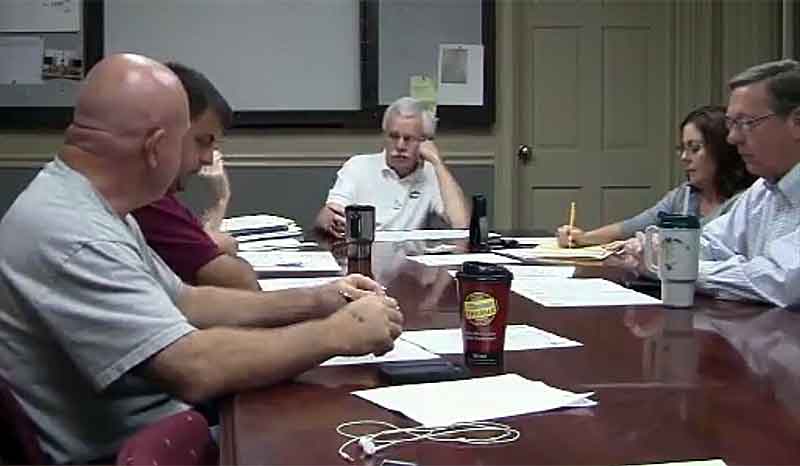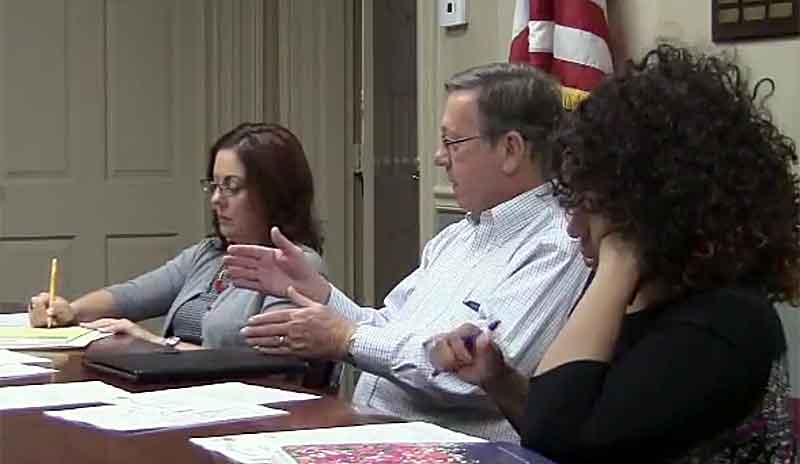Water quality issue prompts request to evaluate city treatment system
By JIM BROOKS
Nelson County Gazette / WBRT Radio
Monday, Oct. 26, 2015, 9:30 a.m. — The City of Bardstown is looking at the processes and chemicals it uses to disinfect drinking water at the city’s water treatment plant in the wake of water quality issues that surfaced in May.

Fred Hagan, chairman of the city’s water and wastewater committee, leads discussion during last Thursday’s meeting at Bardstown City Hall.
The city council’s Water & Wastewater Committee was told Thursday morning that the level of disinfectant byproducts in test samples rose above acceptable levels in May. The city investigated and determined the filtration system was keeping too many organic products and not getting clean enough in the backwash process.
The disinfection byproduct that exceeded limits are known as haloacetic acids, a compound formed when organic material reacts with the chlorine used to disinfect drinking water. The EPA has determined can be haloacetic acids can be a cancer threat over a lifetime of exposure.
City engineer Jessica Filiatreau said the backwash process was failing to clean the system’s filters of organic material adequately. Backwash is the process of cleaning by reversing the flow of water through a filter.
All the treatment plants filters have been thoroughly cleaned and checked, and the city sought input from the Kentucky Division of Water. Water quality tests since May have been in compliance, Filiatreau told the committee.
To insure the filtering process is optimal and will maintain the necessary water quality, the public works department wants to allow consulting firm GRW to come in and evaluate the filtration and disinfection process, Filiatreau said.
Larry Hamilton, the city’s public works director, explained the city’s wholesale water customers — which include New Haven, Bloomfield, parts of LaRue County and the North Nelson Water District — are required to send formal notices to their customers when the city’s water quality exceeds any regulated level.

Public Works Director Larry Hamilton discusses the potential benefits of making the city’s water treatment methods more compatible with those of the Louisville Water Co.
Hamilton said he had met with the North Nelson Water District board, and planned to met personally with the mayors of New Haven and Bloomfield and LaRue County water representatives to assure them the city is taking action.
Disinfection products can form in the water system as it ages, which complicates keeping water within acceptable testing limits, Hamilton explained. The fresher the water, the less likely it is to exceed test limits for disinfectant byproducts, he said.
WATER TREATMENT EVALUATION. The city is also considering the possibility of using chloramines in its water treatment process.
Filiatreau said the city is waiting on a proposal from consultant and engineer David O’Conner of H2O’C Engineering of Columbia, Mo., to examine the treatment plant’s disinfection process and the benefits of possible changes to improve water quality.
Chloramines are created by adding ammonia to the chlorine used in treating drinking water.
The chemical change would improve water quality and taste as well as reduce problems caused by disinfection byproducts like haloacetic acids.
A change in the water treatment process would have the added benefit of making the treated water more compatible with water provided by the Louisville Water Company.
Currently the different treatment process make the systems water incompatible and they cannot be mixed. A change would allow the City of Bardstown — if necessary — to bring in treated Louisville Water, Hamilton said.
“We believe its advantageous to go down this road,” he said.
-30-






